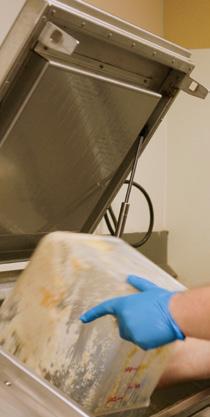
3 minute read
Reducing food waste
Environmental pilot paves way for permanent change
ADDRESSING FOOD WASTE AND INTRODUCING SUSTAINABILITY SOLUTIONS ACROSS THE MINISTRY
Imagine the sheer number of Ascension hospitals and other sites of care across the country that serve food. Now think about the amount of food that is generated to nourish all of the patients, loved ones and caregivers within those facilities on a daily basis — more than 150,000 meals a day on average. Although processes are in place to reduce its impact, it’s not surprising that waste due to preparation, overproduction and uneaten food can account for up to 15% of Ascension’s total municipal solid waste sent to landfills.
Ascension is working to change that, with a goal to reduce total waste sent to landfills by 6% by May 2023.
Medxcel, in cooperation with The Resource Group and TouchPoint Support Services, which serves as Ascension’s Food and Nutrition Services provider, led a three-month food digester pilot study at Ascension St. Vincent’s Riverside in Florida and Ascension Saint Agnes in Baltimore to determine if the technology would benefit other Ascension hospitals. At the conclusion of the 12-week pilots, 32 tons of food scraps and downstream food waste were successfully diverted from landfills and instead became gray water. Gray water is wastewater such as from a sink or bath that doesn’t contain any serious contaminants.
“Not only is this program reducing our environmental footprint, we also are making it safer and easier for our Food and Nutrition associates,” said Matt Tromba, Director of Food and Nutrition at Ascension St. Vincent’s Riverside. “By cutting our production of waste, we will require fewer heavy containers to be carried to a dock or dumpster.”
— CRAIG CORDOLA, MBA, MHA, FACHE, EXECUTIVE VICE PRESIDENT AND CHIEF OPERATING OFFICER, ASCENSION

Chase Turgeon, TouchPoint Support Services Regional Executive Chef, operates a food digester at Ascension St. Vincent’s Riverside in Jacksonville, Florida.
Installation of 60 food digesters across Ascension is underway, following an exploration of other sites that could benefit and continue the success of the pilot program. During installation, Food and Nutrition Services associates are trained on the new technology, which has also increased operational efficiencies in the kitchens and waste collection areas while simultaneously reducing Ascension’s carbon footprint.
“The food digester work is a great example of how collaboration has led to long-lasting change for our hospitals, our communities and the environment,” said Craig Cordola, MBA, MHA, FACHE, Executive Vice President and Chief Operating Officer, Ascension. “This is just one of many ways we are changing how we do things to better care for God’s creation and attain our bold goal of net zero carbon emissions and zero waste by 2040.” FIVE SUSTAINABLE SOLUTIONS FOR YOUR HOME
Ascension continues to find ways to reduce our environmental footprint. Associates can make a difference in their home and around their communities as well:
• Minimize single-use plastics such as straws, cup lids, storage bags, utensils and bottles. • Replace fluorescent and incandescent light bulbs with LEDs. • Buy products from companies that are dedicated to environmental responsibility. • Plant a garden. Beginners can start with easier plants such as tomatoes, bell peppers, cucumbers, basil and beans. • Reduce your meat consumption.
Try going meat-free on Mondays or
Fridays or stick to vegetarian meals before dinner.
JOIN A GREEN TEAM Check out the Environmental Impact & Sustainability microsite to learn more and get involved. Visit ascension.org/sustainability.






